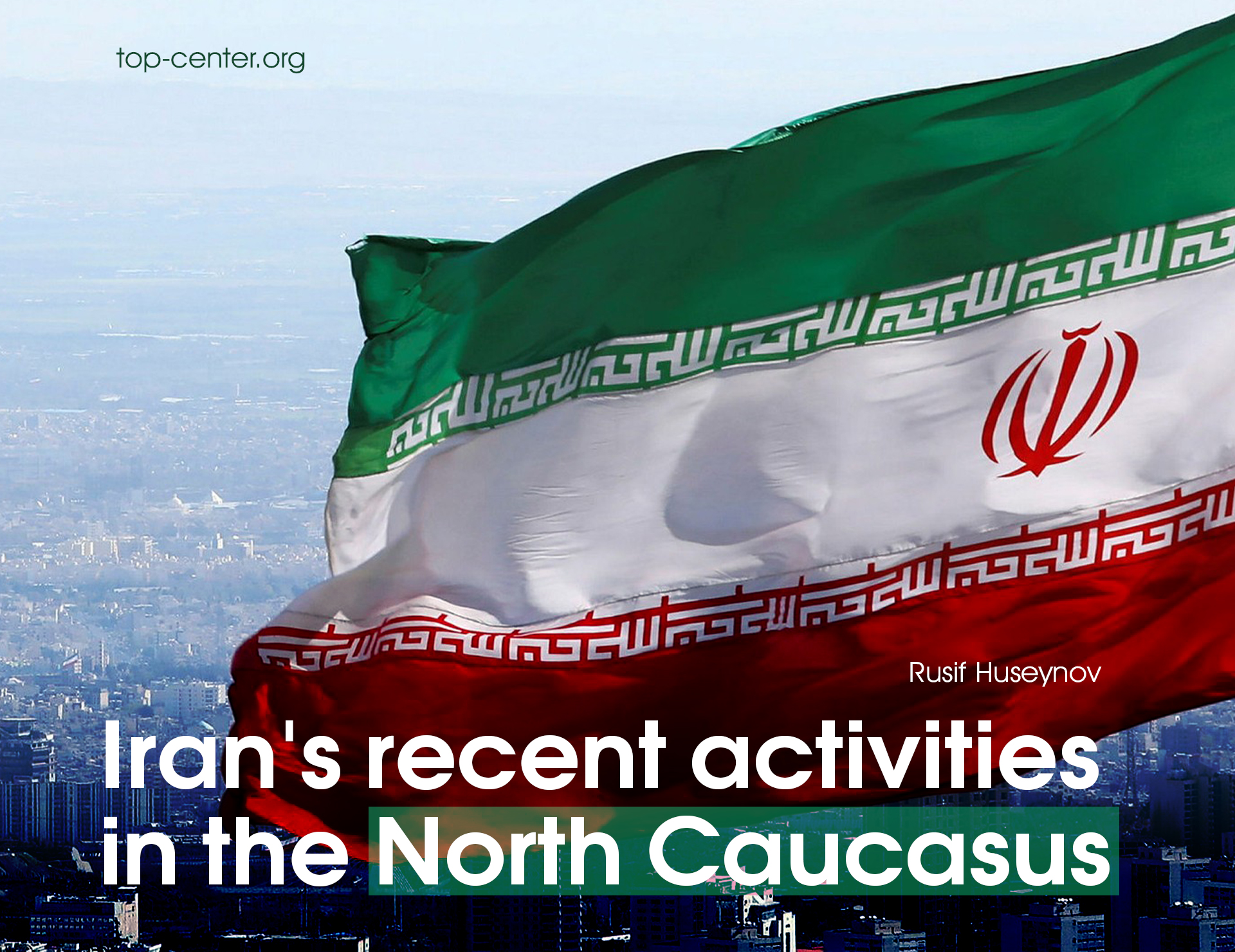Iran's recent activities in the North Caucasus

Amid the dramatic changes in geopolitical realities in the Caucasus, one cannot ignore Iran`s assertiveness in the region, especially in the northern part. Some experts believe that the very fact of Iran's appearance in the arena is nothing more than an agreement between Iran and Russia to fill a kind of “vacuum”, where Iran will play the role of a regional “watchdog” of order. At the same time, an alliance with Moscow is purely situational for Iran, because in the collective memory of Iran, Russia is perceived as a country that has entailed at least "national humiliation". Yet, this collective memory is still a driving force for Iran`s ambitions to take advantage of the historical opportunity and “restore” its presence in the Caucasus (especially in Azerbaijan and Armenia).
At the same time, Iran is deliberately attempting to "enter" the North Caucasus, which is traditionally considered a zone of Tehran's interests. Iran is penetrating the North Caucasus through various economic, cultural, and other projects. Official Tehran as an economic partner pops up on the news agenda of North Ossetia, Ingushetia, Dagestan, and Chechnya. Last month, for example, was marked by the opening ceremony of the Trading House of Iran in Makhachkala. This Trade House implies the representation of Iranian commercial organizations and factories of various industries, where Dagestan businessmen who want to build trade relations with Iran will be able to get acquainted with the products. It will also be possible to contact a representative of a particular company by concluding an appropriate trade agreement.
In addition, in 2017, it was revealed that businessmen from Iran are ready to invest about $15-16 million in a pharmaceutical company in Dagestan`s territory, not far from Kaspiysk.
Iran also offered Dagestan assistance in the modernization of the Makhachkala seaport. In this way, a ferry service will be established, which is currently impossible without dredging activities. Tehran noted that they have the necessary investments, equipment, and qualified specialists for this. It is quite interesting that it is Iran that sends building materials to the occupied Donbas and Luhansk regions of Ukraine, and all these materials are sent there through the Seaport of Makhachkala. From the beginning of 2022, Makhachkala Commercial Sea Port (МCSP) manufactured more than 108 thousand tons of Iranian cement. Compared to the same period last year, volumes doubled in 8 months of 2022. In addition, since the beginning of 2022, about 285 thousand tons of cement, grain, clinker, tiles, flour, and salt have been processed as well.
Iran is also penetrating the daily lives of the Dagestanis. In October, last year, within the framework of the international music festival "Russia – the Universe of Sound" held in Dagestan, a concert "Untrodden Paths" presented classical Iranian music to the audience. The Iranians are also interested in establishing their order in the religious life in Dagestan. At the same time, official Moscow sees the Shiite community of Dagestan, especially in Derbent, as a natural barrier against the Wahhabi-Salafi movement spreading in the North Caucasus, and therefore supports this community in every possible way. Therefore, Russia prefers to turn a blind eye to Iran's work in this direction and use it as an opportunity.
It should be noted that while in the south of Russia, especially in Dagestan, humanitarian and educational institutions of other countries were closed, Iranian intelligence agencies continued to operate freely. These organizations continue their destructive activities in the North Caucasus, especially in Dagestan, under the guise of religion. In addition, Iran has provided great support to the radical Lezgins in the matter of “mastering” Caucasian Albania. Iranian propaganda also inculcates the Azerbaijanis of Dagestan, in particular, Derbent, with the idea that they belong to the Persian tribes, which later became Turkic. At the same time, if Russian political circles use Shiism through Iran as a tool against radical Wahhabism, they also use Sufi sectarians as a balancing tool to prevent Iran from getting out of control.
It is worth recalling that before Iran was also mentioned in cooperation not only in business and education but also in the field of combating terrorism among students.
Iran is also active in other regions of the Russian Federation, for example, in Chechnya. For instance, the trade representative of Iran in Russia, Mohsen Rahimi, said that probably soon an Iranian Trade Center with its trade representation will be established in Chechnya. It was assumed that the flow of goods through the port of Makhachkala will increase due to the inclusion of Chechnya in the process. As follows from the order of the Government of Chechnya, a delegation of 15 participants headed by the prime minister will work in Iran. The delegation was supposed to work in Iran from 21 to 25 September. The list of members of the delegation shows that Chechnya plans to cooperate with Iran on a wide range of issues. At the same time, the Iranians paid special attention to two economic zones of Chechnya - industrial Grozny and tourist and recreational Veduchi.
North Ossetia is Iran's other main foothold in the North Caucasus due to historical, linguistic, and cultural ties/kinship between the two and a "strong element" for Iran in securing the Caucasus. The Ossetians themselves are considered representatives of the Iranian group of Indo-European peoples. Ossetic (Alani) language belongs to the Eastern Iranian language group. In the past Ossetian people called themselves "iron" from the republic of "Irostan" (Ireston / Iriston), which is consonant with the name "Iran". The largest social stratum of the Ossetians still bears the name "farsag", which is consonant with how the Iranians call themselves "Farsi". Considering Ossetia’s strategic location in the North Caucasus, Iran is trying with might and main to use the existing close relations.
According to the Ossetian news portals, in the near future, it is planned to work on a "road map" for the development and strengthening of economic and cultural ties between North Ossetia and Iran. An agreement on this was reached in Vladikavkaz at a meeting between the Head of the Republic of North Ossetia, Sergei Menyaylo, and the Ambassador Extraordinary and Plenipotentiary of the Islamic Republic of Iran to the Russian Federation, Kazem Jalali.
Ambassador Jalali took the initiative to hold an Iranian cultural week in North Ossetia during his next visit. The exact dates have not yet been specified, but one of the venues for the event has already been determined - the North Ossetian State University (NOSU). NOSU is actively developing academic ties with the Islamic Republic of Iran. This University cooperates with the Allameh Tabataba`i University and the University of Tehran. There is a regular exchange of students and teachers between universities. In addition, the joint master's program "Iran in the Modern World" has been functioning for the third year in a row. The North Ossetian University's Faculty of History recently opened a new program called "Oriental Studies" (Iranian direction). The Izvestia magazine also released a special edition with articles penned by scientists from Iran and the North Caucasus.
Iran is extremely interested in unblocking transport corridors. It is crucial for Iran to become a key link in the North-South transport corridor, and thus strengthen its security and sphere of influence. Apparently, Iran prefers to consider all possible scenarios, one of which is the collapse of the Russian Federation. Iran considers Azerbaijan and the probable return of its once-occupied lands one of the first threats. The strengthening of the Azerbaijani minority in Dagestan does not fall within the framework of Russia's national interests as well, and therefore it voluntarily agrees with the penetration of Iranian soft power into the region. It is not surprising that precisely those areas surrounding Azerbaijan remain under Iran's special supervision. Another reason is competition with other countries of the Middle East, particularly Saudi Arabia in cooperation with the North Caucasian republics.
[1] This refers to the Gulistan and Turkmenchay treaties.







